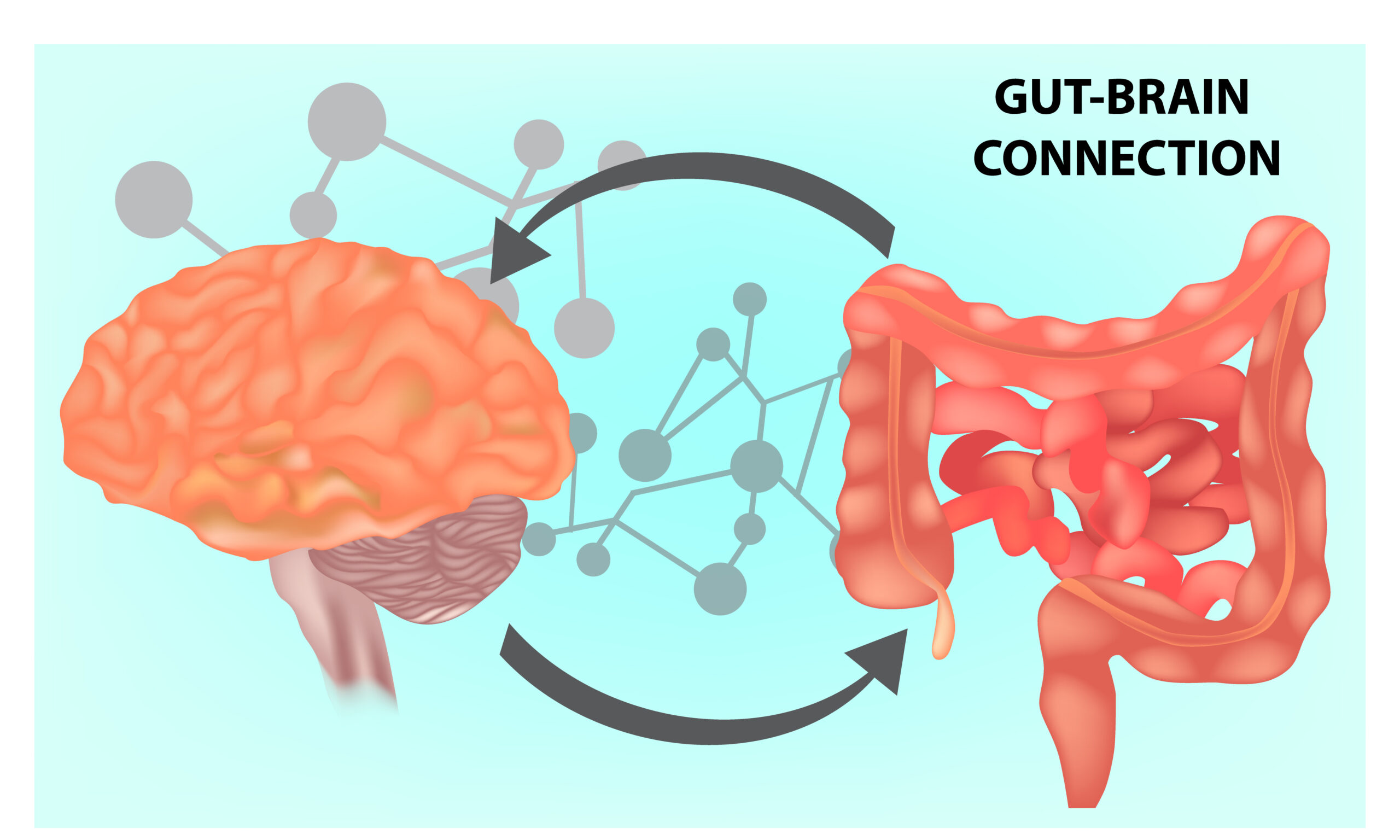Food & Mood:
How Food can Help you Feel Happy
The gut-brain relationship is now well known and documented. We know that 90% of our happy neurotransmitter, serotonin, is not made in the brain but in the gut. Research now confirms what many of us already knew: food can be healing for body, mind and soul. In this era of mediatic scare on everything related to health and wellness, let’s reclaim our relationship with food and rediscover how well it can sooth us in the good and bad times.
The Gut: Our Second Brain

The gut is surrounded by the enteric nervous system which contains the largest collection of neurons in your body (between 100-500 million neurons), more than in your brain. The gut’s enteric nervous system and our brains talk to each other through a cranial nerve called the vagus nerve.
Microbiome and our Mood
In the brains of depressed and anxious people we see a lack of serotonin, some researchers attribute this to a problem in the gut.
Our microbiome is composed of the living bacteria in our intestines. When there is a high amount of ‘bad bacteria’ in proportion to ‘good bacteria’ in the microbiome this causes inflammation. Depression and inflammation are closely linked as the bacteria that causes inflammation are found in higher numbers in people who suffer from depression. The production of neurotransmitters (dopamine, serotonine, GABA) all need the presence of normal gut bacteria in the gut microbiome to be made. These neurotransmitters are essential for stabilizing mood, for keeping you calm, attentive and for ensuring a sharp memory. An unhealthy gut microbiota can result in an unhealthy brain.
For more on how to eat to promote gut health check out the following article.
2 Ways Food Influences your Mood
- Keeping a healthy microbiome to avoid inflammation and promote proper nutrient absorption.
- Eating specific foods that contain the metabolites to act on the brain in a positive way
What to Eat?
Ok, we know we need to keep the gut microbiome healthy but what else can we do?
The food choices we make have a deep impact on our mood. And how could they not? The foods we eat is our energy source, they are our nourishment and if essential nutriments are lacking it will affect our brain, our hormonal system, our energy and our mood.
It’s important to note that ultimately it is the diet that you have that has a real impact on your mood. Traditional diets such as the Mediterranean diet, the Nordic diet and the Japanese diet are great examples of modes of eating that promote a good emotional state. You do not have to follow these diets strictly to reap the benefits but you do have to follow certain key components. Here they are:
- Vegetables: abundance (6-9 servings) and a wide variety of
- Fruit: seasonal (0.5-2 servings)
- Healthy Fats: Extra virgin oils such as olive and coconut oil
- Carbohydrates: whole grains or root vegetables
- Protein: prefer beans, legumes, nuts and seeds and fish
- Add flavor with herbs and spices
Mood-Food Cheat Sheet
Let’s go into detail on the micronutrients needed for emotional health. No matter how great of an attitude you will yourself to have, if you do not have the proper building blocks for your brain and gut you will constantly be fighting an uphill battle with your mood.
Omega 3s
These are a classic and have been over-talked about for the simple reason that they are deficient in many people’s diet and are essential to good mental health. One of the reasons we are so low on this fat is that the fats many of us choose are over laden in omega-6 fats which are also healthy but are in too large of quantity in our diets (too much of a good thing). Studies show that individuals with a high ratio of omega6 to omega3 fatty acids had a higher chance of depression.
- Cold water fatty fish: salmon, cod, (eat the fat), mackerel, herring, oysters, anchovies
- flax, chia seeds
- walnuts, soy beans
- vegetable oils: olive, walnut, …
Eat less Omega-6 fats to reduce chances of depression:
- fatty red meat
- palm oil, corn oil
- full-fat cheese
Magnesium
Many of us are deficient in magnesium due to depleted soils and lack of high nutrient diets. Choose foods grown on strong soils (biodynamic planting) and rich in this mineral:
- dark leafy greens,
- legumes,
- dark chocolate,
- nuts and seeds
Selenium
Brazil nuts, tuna, oysters, chicken breast, tofu
Spices & Herbs
Have a high content in antioxidants therefore help the brain fight free radical damage.
- turmeric,
- saffron and
- oregano
Vitamin Bs
are essential to healthy nervous systems. Think:
- whole grains and
- legumes
Vitamin B12 & Iron
If you are vegetarian you are most at risk to have a deficiency in this essential vitamin and mineral for brain health.
Vitamin B12
- Fish: salmon, trout, sardines, tuna, clams
- Animal meat especially liver and kidneys
- Eggs
- Nutritional yeast
- Dairy products
- Shitake mushrooms
Iron
- Animal meat
- Legumes (including tofu, tempeh and nato)
- Green leafy greens
- Seeds (pumpkin, sesame, hemp and flax)
- Oats, amaranth and spelt
Who are you Feeding?
Bringing a mindfulness-based approach to eating can help us shed awareness on our sometimes troubled relationship with food. When we talk about mood and eating, we can also think about comfort foods. We all have our own coping mechanisms for strong emotions and many of us resort to eating for comfort. That’s okay, it was a learnt way of coping with strong emotions that worked for us in the past. Food is such an intricate part of our rituals, habits and ways of living. It is something most of us do at least 3 times a day and we all carry our own relationship with it. When trying to change dietary habits it is interesting to become aware of why we are hungry or want food. Asking ourselves, without judging, who we are feeding, every time we eat brings us a new level of awareness that can shine light on this often troubled relationship.
Conclusion
By caring for our microbiome and eating the essential components of a traditional diet we are on the right track to a healthier body and mind. No other organ demonstrates the connection between mind and body as well and our intestinal track, this is why eating the right foods can have such a powerful impact on the mind. Remember that one bad meal or one difficult day won’t make or break your mood, it is what you eat on a regular basis that really has an impact on your mind, body and mood:)

To help determine what is right for you, please leave me a note here.

